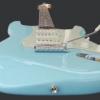Hello
I am 18 year old guy. I had a growth spurt early and have pretty much finished puberty. If you look at people my age and older who were athletic when they were younger, they look different - high testosterone features - high muscle mass and more sculpted faces etc. I was a lazy kid who didnt eat much and didnt exercise/do many sports - I am 6 foot, but have very little muscle mass, 12% body fat and a chubby and non-defined face - low testosterone features.
At 18 I wont grow physically per se. But increase in testosterone will help be put on muscle mass and make my bones to become more developed (all over the body) and increase facial definition. I have been going to the gym doing a high intensity (5x5 of 3 core exercises), 3x a week. My muscle increase has been very limited (not noticible and no different on scales) although the increase in my maximum lift has been increased significantly for a beginner (squats went from 40kg to 80kg in 6 weeks). Now, I dont think I have low testosterone - I am a horny teenager and masturbate/have sex atleast once a day, I have above average body/facial hair, am not depressed or anxious, but just lazy and a bit unmotivated.
So, if I use natural methods to boost testosterone - whether herbal supplements, diet control, lifestyle changes etc - is that ok or can it have adverse effects at my age? Also, will have lead to desired results - increased muscle mass with exercise and facial/body bone growth? Anyone have anecdotal evidence of impact of testosterone boost in their teenage years? Any suggested herbal supplements to boost testosterone?
Cheers




















































